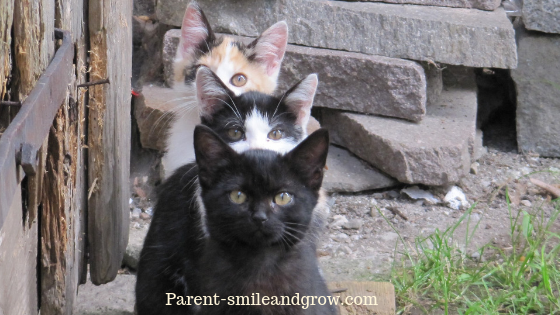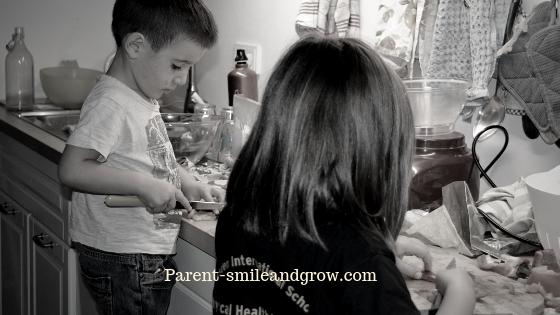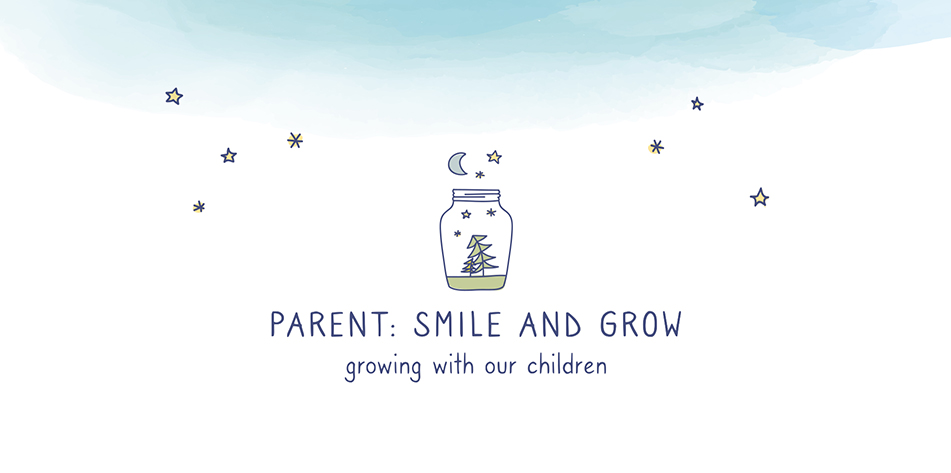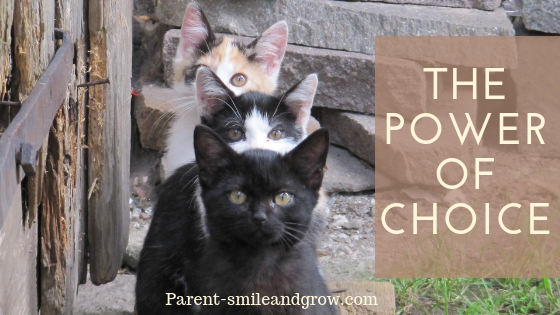You probably experienced at least once in your life to get in a situation over which you had no choice or control. Traffic jam. Train or plane cancelled at the last moment. Got sick right the day of your important meeting/vacation/event. And you felt that strong frustration and anger. Our children often experience the same angry frustration when we decide everything for them.. But we know better, right?! Why having a choice is so important? What lesson does having a choice teach us and our children? And why should we always give our kids a choice?

Table of Contents
I want to make a choice!
Dinner was ready. We called the children, and as usual, this triggered THE question : “Is there pasta?” Now, we’re Italian, it’s true, but I still believe it is important to eat a little bit of everything ..
No, honey, we had pasta yesterday, and you had also pasta at lunch in school.
Mamma!!! You know I only like pasta! What are we eating then?
Come and see my love
My daughter looked half sad, half disgusted at the roasted salmon and the sauteed spinach on the plate. Tears started rolling down her cheeks.
I don’t want to eat this! I don’t like it!
Honey, you haven’t even tried it!
YOU don’t understand! I KNOW I don’t like it! You want me to eat it just because you always want to decide for me! I want to choose! I want to eat what I want to eat!
Let’s stop right here. This was a very typical scene in our house over the last months. Whenever I told, especially my daughter, something she was supposed to do (leave the house to go to the playground; put the jacket on; put a certain pair of shoes or of pullovers; eat something different than pasta or chocolate; and so on) she yelled at me very angrily one – or more- of these sentences :
You always want to decide for us, it’s not fair! I’m old enough to decide! I want to choose what I want! When am I going to be old enough to make a choice?! You only tell us this because you want to give us orders!
Because I said so! Why failing to give your kids a choice is bad
With my son, it would be different. Of course he’d say no to things, but it was easier to have him change his mind, or to accommodate towards a compromise. This whole power’s struggle, this deciding issue, was unknown to him.
So my daughter’s reaction stroke me after a couple of times; and at first, my reply was I’m older and more experienced than you are, therefore I decide for you. When you’re going to be a grown-up, you’ll decide for your children
or other sort-of useless answers.. That’s the way it is sort.
But honestly. Who’s ever liked that kind of answer from his parents? Certainly not me! So after a while, it bothered me to just position myself as the authoritarian boss, it doesn’t fit me well, and I didn’t feel it right.
On the other hand, I didn’t want to let her speak to me like that all the time either.
But you know, for some time, I just let things be the way they were, rolling my eyes and sighing at these unpleasant reactions. She’s a strong-willed child, it can be good for her in the future if she learns how to control herself.. Bla bla bla
Something wasn’t functioning though. For one thing : I’m the one who’s supposed to teach my children how to control themselves. Second, it was just very tiring and exhausting to have fights over anything! And if I’m more patient, my husband couldn’t stand it when we had to argue the whole weekend. I needed to figure out a solution.
When the choice isn’t easy
I’ll take a step back. Over the last year in particular, I’ve been thinking and wondering about this whole choice-thing.. as I was facing a personal, difficult and eventually life-changing choice. Because I always felt that choosing meant giving up something.
And I ended up realizing that I’m really bad sometimes in taking decisions. I always search for the compromise, or the “have-it-all” situation, and when that isn’t available, I’m just paralyzed, and rather have somebody else deciding for me.
So you can always say “I had to.., it’s not my fault! It wasn’t my choice!”
When younger, it was especially evident when we’d go to a restaurant. I remember once, we weren’t living in France yet, and we went with a couple of friends to spend a week holiday riding the bike around the Loire Valley, to visit the castles.
One of our friends is one year older, but celebrates his birthday on the same day as me, so we often make fun of our similarities.
There we are, sitting at this cute little French restaurant, with a varied and interesting menu, and we continuously go back and forth through all the different options; our partners have already chosen, and we just aren’t able to make up our mind, there are soo so many options..
Sure enough, when we finally get our food, we’re both disappointed and feel like we made the wrong choice.
Why have I always found the process of taking a choice particularly difficult? But.. What about the other option? I want to have it all and experience everything! What if I change my mind? What if I’m not satisfied with my choice?
My beloved children, you should thank me for taking this burden of having a choice away from you! Or should they? Am I not perpetuating something here? Am I really teaching them a lesson?
Give a choice kids, how does it feel like?
Let’s pretend we’ve booked a flight to attend a dear friend’s wedding. We took a couple of days off, organized everything, and we’re happily waiting at the airport for the gate number to be announced. All of a sudden, a dreaded sign appears : “Flight cancelled”.
We’re incredulous and shocked. There must be another solution, right? They’re going to offer us a place in the next flight! But nope. Next flight is in 3 days. The wedding is gonna be over. We think about all the possibilities, but there is no way we can make it.
How do we feel? Most likely stressed, angry, frustrated.. also sad, because we were expecting something totally different, and because we will miss out something we felt important.. We wanted something different.
That’s the feeling we get when somebody else’s decides for us, or when we have no choice over our lives. Making a choice has been found to reduce stress level (read : cortisol), thus also reducing anxiety and negative thinking.
We often identify choice with freedom, and it biologically makes us feel good. So when we’re imposing something on our children, they feel like we did when imagining that canceled flight.
Besides, making a choice also means taking the responsibility for its consequences.. Now, being responsible is a value I definitely want to pass on to my children. Yet, on our everyday life, I tend to take action for them.. They’re still young, they need to learn. I’m in charge for now. I’m responsible for them.
Connected: 5 sentences you must stop telling yourself if you want to live longer

A positive discipline’s approach to choice
So for a few months, I was facing this dilemma on how to deal with my daughter’s struggle for power and have a calmer home environment. I started following different blogs on parenthood, reading a few books.
I bumped into some online courses, which I thought could have been interesting; so I made it one of my summer goals and I signed up for a French course on positive parenting.
The main principles of the discipline, for as I knew it, were deeply in accordance to my own values; but I was a bit skeptical, afraid to infringe it towards a permissive style which could have led my husband into taking the authoritarian one.
Instead, I was happy to note that the rule setting process was a strong part of this approach too.
Why your emotions say you have to give your kids a choice
At some point over the course, I’m presented with this interesting method : what emotion does the unwanted behavior of your child trigger? Your reaction should depend upon this emotion. I’m synthesizing it here, but it sounded very strange and yet captivating.
When I’m feeling angry or challenged by my child’s behavior (which was indeed my case most of the time) : the child’s mirrored goal is to seek control, because she believes that she exists only when she has control over what’s going on.
My response should be : give her a choice.
And what is the first thing I should recognize? I cannot force my child to just do what I want.
This is hard! Because I’m surrounded by opposite messages : Children need to learn that there is an authority, and that they can’t always do as they want.
The practical tips on giving a choice
I still wanted to give it a try though. Because, as we just saw, and as all of us have experienced, the feeling of powerlessness is not a pleasant one. The raise in cortisol in our children triggers all those inexplicable behaviors we don’t like..
Aggressiveness, open challenge, or paralysis to name a few. Just like we would react if we really were at that airport.
So here’s a few of the suggested tips (you can sign-up for this course here – in French) :
- offer a limited choice during the critical situation :
I see you’re feeling so angry! When your teeth will be brushed, do you want to read this story or that one?
- redirect her power towards something useful : if she’s punching on something she wants to get, or out of frustration we may say
I see you have such strong arms! I’d really need your help then because I have to move this big box and I can’t do it by myself, could you help me? I need your strength!
- plan some one-on-one time with the child
- during a family conversation, ask her advice to find the solution to a problem
- instead of focusing on what the child should do, when presenting a rule stress out what you are going to do if the rule is not followed : for example,
every evening I’m going to throw away all the toys that are laying on the floor
; orI’m going to wash only the clothes that are in the dirty-clothes bin
; and then stick to it.
The love and logic approach: why you should always give kids a choice
Something wasn’t working right for me. I did introduce the “I will do” thing with a couple more rules, and that works great. But on the choice offering? I wasn’t consistent enough.
Also, I often lacked ideas as to what choices to offer on the spot; and if I did offer some redirection, my daughter would get even angrier. I was doing something wrong!
I was presented with a slightly different approach during parenting class (I know I mentioned it so many times already! but.. it gives me so many insights and inputs!). This class is based on the “Love and Logic®” approach, by Jim and Charles Fay.
So the opening sentence of that day’s class was :
The more control we share, the more we have. The less control we share, the less we have.
I hung it on my fridge. Just to make sure.
Why planning is key if you want to give your kids a choice
How was it different than the positive approach I learnt about? The preparation ahead. List all the potentially struggle-like situations, and come up with 2 choices to offer my child. Both options must be something I’m OK with. (You can find here some more examples.)
Most importantly : I give these choices BEFORE any struggle or resistance arises. And I use the word “choice” or “decision” or “responsibility”.
It made all the difference! And it’s like a training : now I’m offering choices all the time, and it actually makes it easier when I really need to decide something myself.
When they take too long to decide, I do it for them. That makes them furious! But here’s the lesson : you need to decide for yourself in life, otherwise the others will decide for you. And you ain’t gonna like it.

Is having a choice always good?
Having a choice is fundamental for freedom; but making a choice IS difficult. That’s probably a good reason for training my children early : the consequences of a bad choice aren’t so dramatic yet.
I believe that partly, what makes this process so hard is that we’re used to having so many options to choose from! Which is also why it’s good to give your child only 2 options to start her training with 🙂
But seriously. I feel sometimes that the pressure from our society to be perfect is huge : You have so much freedom, you can choose from endless possibilities, you can be anything you want! You can’t be imperfect; you have no right to feel sad or unsatisfied; that’s unacceptable.
Perfect life and constant satisfaction of our desires. What if… ?
You can watch an interesting video about this here :
Choice as a way of exploring needs

During that famous parenting class, we were asked to list our usual struggle-situations. The one that came into my mind was this one : morning routine.
As I’m writing early in the morning, I’m often not ready as I’d plan when I wake my children up. So we’re in a hurry and I ask my daughter to do something on her own, usually getting dressed or brushing her teeth.
She never ever wants to; she wants to stay right next to me, or that I do things for her. It drives me nuts I admit.
I imagined the reason was that she is jealous of her brother, who is younger and still needs my help.
Could this situation be a good one for the implementation of the choice strategy ?
She needs you..
The answer I received illuminated me : She’s probably doing it because she needs more time alone with you. Your exclusive attention. You could ask her whether she prefers your attention to get her ready in the morning, or to do a particular activity together later in the day. And careful to stick with this dedicated time is she chooses that option!
It should have been straightforward! It’s true that, while I try to dedicate my children time and attention and to do things with them, it’s rarely on a one-on-one basis.
It’s also stricken me that those mornings when I bring only her alone to school, she is ready in half of the time with no complains…
Giving her a choice in a strategic way has saved both of us from potential conflicts, and is teaching her to take responsibility over the consequences of her choices.
The choice when there’s not a better option
Shall I go to university? Which one? Shall I quit my job for an insecure position elsewhere? Sometimes, there’s not an evident solution.
In my life, I always tended towards giving up my emotional side and going with the more rationally logical choice. That way, I could argue with myself : it’s a better choice because of such and such incontrovertible reason.
But at some point, I understood that this way of thinking wasn’t making me happy at all. And worst of all, I was feeling helpless. Like “I have no choice, I have to hold on tight and be strong”. Feeling it wasn’t fair, but that’s the way it is. That the good things were for the others.
Then, I read for totally different reasons the book 'non-violent communication” from Marshall Rosenberg. At some point, he suggests suppressing any form of “I must”, “I should”, “I had to” and change it into “I choose to”. To assume responsibility of our actions.
“I chose to accept this job” instead of “I had to accept it”. I’ve tried doing it. And there, feeling what saying those words made to me, I understood the link between choice, freedom and responsibility.
Let’s face it, sometimes the two options are equally good, but one will make us feel better. And by choosing instead of letting others choose for us, we feel empowered.
Choices are not always easy and good vs bad, they only have different consequences and different values associated with that. When I’m able to create the reason that explains my choice, I define myself in my choice.
This is how philosopher Ruth Chang describes it:
It is here, in the space of hard choices, that we have the power to create reasons for ourselves to become the distinctive people that we are.
Resources
A few useful resources for you to dig deeper if you want!
Note: some links may be affiliate links. It means that if you buy something after clicking, I might get a small commission. All opinions are my own.
-
If you’re a parent, you’ll love this parenting guide. I particularly loved the section about parenting during difficult times, and the age appropriate tips. Definitely a must read!
-
What’s the theory of choice and how can it be useful for us to know about it?
-
I also loved reading about how the process of choosing works
-
You might also want to deepen why positive discipline promotes the use of choice with kids: limited choices with your children?
-
You don’t want to miss Jane Nelsen's books about Positive Discipline. It’s one of the best resources I’ve ever found during my parenting journey.

